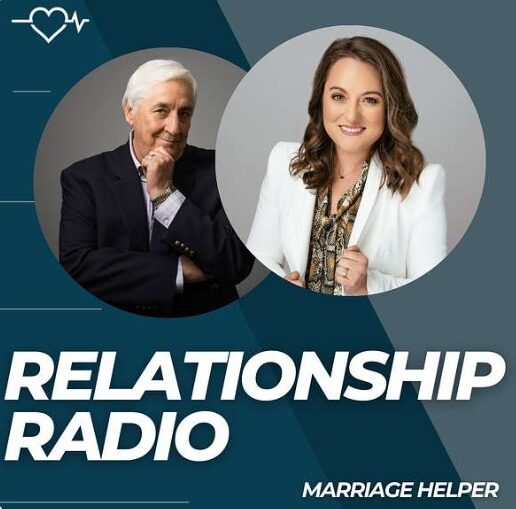Here is the transcript from this week’s episode of Relationship Radio.
Kimberly Holmes 0:06
If you are experiencing a separation or a divorce in your marriage, then one of the hardest things that you have to face is telling the children. And this is not a subject to take lightly. And we have some tips that we’re going to share with you today on how to talk to the children about what’s happening in the best way possible. Welcome to today’s relationship radio episode. I am joined today by Dr. Joe beam.
Dr. Joe Beam 0:34
Glad to be here. Welcome soon to be Dr. Holmes.
Kimberly Holmes 0:38
Yes. Now that we’ve said that so many times I have to finish you have to there’s no way around it no matter how frustrating my statistics class,
Dr. Joe Beam 0:45
exactly. Remember, what Will Rogers, the famous humorist said well, before you ever lived, he said, there are three kinds of lies, lies, damn lies, and statistics. So just remember that
Kimberly Holmes 0:58
I will, I will remember. All right, so today we’re talking about how to tell my kids my spouse is leaving, or how to tell the kids we’re separating or divorcing, heartbreaking conversations no parent ever wants to have to have. But unfortunately, sometimes,
Dr. Joe Beam 1:15
and not just about divorce, but about separation. Sometimes one or, or the other spouse, of course, will move out, like my husband’s like, I’m gonna get my own apartment, actually, sometimes just the wife, I’m gonna go get my own apartment. And here you have children. And the way to tell them is going to depend on how old they are, and actually is going to be affected by whose children they are. So for example, if you are a family where that some of the children are biologically his and or some of the children are biologically hers, and then maybe there’s even some that, that they have to get her, that can actually alter the way you do it as well. So it’s based on the age of the children, the mixture of the children when it comes to who is the biological parent. But if you’re going to do it, we have some dividend suggestions about how,
Kimberly Holmes 2:00
Okay, so how? Chime in.
Dr. Joe Beam 2:03
the first thing and this is the best way, if you can make this happen, this is the best way to do it. The spouse who is leaving should be asked by the spouse who’s going to keep their kids the ones who are going to live with and then say, okay, the two of us together need to sit down with our children and tell them what’s going on. And we need to make it age appropriate. Now in just a minute, we’ll talk about well, what if my spouse won’t agree to do that. But right, now, let’s say that he or she will, you’re gonna make some ground rules up front. And the ground rules would include such things as neither one of us is going to say anything negative about the other in front of our children, not just in this discussion, but ever. Now, sometimes the children might have some negative negative things to say. And if the child does have something negative to say, we’re going to listen and try to understand, but we are not going to feed into the brain of the other child bad things about their mom or their dad, we’re not going to do that. The second ground rule would be we’re going to tell them to truth based on age. In other words, you don’t tell the same thing to a four year old that you tell to a 14 year old, based on age, and based on whether the truth we share would create a visual, because you do not want to create a visual and the man of your child about what one or both of you are doing. I’ll explain more about that in another minute. And so when you get those kinds of ground rules up front, oh, and we’re gonna be calm, nobody’s gonna get histrionic, nobody’s gonna get upset, we’re not gonna weep and cry, we’re gonna present a strong face to our children. And so together, we’re gonna sit down with the kids at a time when there’s nothing else interfering. TV’s off, cell phones are off, et cetera. And the spouse who is leaving should be the one who says to the children, I’m going now explain enough that they know it’s not their fault, but not so much that they hear either something negative about their other parent, or that they start having a visual about something you’re doing this going to terribly upset them. And so it could be something like this, Mom and I have hit a rough patch. And we feel if that’s not right, honest and say I feel, I feel that it’s time that pro while I need to live someplace else, I want you to know, I still love you. And that there’s nothing in my world more important to me than you are. So understand that. This is a decision I’ve made based on the relationship with your mom, or with your dad, and just not having to do with anything that we’re unhappy about with you. And so you make that very clear, and very obvious. Now then you had to be ready to answer your questions. And both of you have to answer. Honestly, again, being careful not to throw the other person under the bus. And so if, say the 14 year old looks at you and says you Is there someone else? Well, we recommend that to tell the truth. And the reason we recommend that is because if you lie, no, now, there’s nobody else at all. Understand that you’ll never be able to control what it is that your 14 year old is going to hear from other people, the kind of things they’re going to discover the kinds of things you’re gonna find out. And the last thing you want to happen right now is for that child to believe that you have just blatantly to their face, lied. And so if there is someone else, you can say, well, yes, right now, I’m sorting through some things, and it does involve another person. And so you answer, honestly, you understand, but without creating a visible are something that they can see in their own mind. And so if she says, well, then have you been sleeping with a woman? Then you would answer that 14 year old? Whatever the age appropriate is, you’d answer by saying, you know, that’s not really appropriate to talk about right now. Right? Now, let’s just talk about how much I love you how much your other parent loves you, and how we’re going to arrange things living wise, so that everybody is taken care of. And so you don’t answer those questions. You don’t get angry, like, how dare you ask me a question like that? Not good. You’re gonna answer it gently and warmly, but you’re not going to enter it by giving them something they’re going to be seeing in their mind. You don’t want that to happen, because that’s going to be bad. Now, the other part of that honesty is they make turn to look at the other spouse and say, or other parent, I should say, and say, How do you feel about this will tell the truth. If he’s like, Well, I’m in favor of it, I think it’s a good idea. Your mom should leave, if that’s what you feel. And you say that. But don’t say anything negative about mom, and the process is probably going to be more likely the other way, though, where it’s going to be, well, I wish that it hadn’t come to this, I still hope that some way we could find out to a find a way to somehow resolve this issue. If that’s the truth, then tell them that. But both of you then need to reassure the children, not only up how much you love them, but how many things in their lives, you’re going to try to keep the same, because they fear change. Everybody fears change, particularly unknown change. And so it’s like, this is what we’re going to do to try to not upset the lifestyle that you have. Now. We’re going to be doing this and this and this and this. And those, of course, then need to be things you have talked about earlier. So Kimberly, I went through about five minutes there kind of a long ramp, ramp, calm that if you will. That’s not a rant, was kind of a long explanation of that. What do you think about what I’ve said so far?
Kimberly Holmes 7:32
So I would just make sure that the audience understands that on that front end is making that plan of what are we going to tell the children stays the same in their life? And what are we going to tell them about what changes to expect? And following through? I know that happens afterward. But make sure that what you say is going to stay the same? Yes, that you actually can do if you say I’m going to take them to dinner every single Friday, you better be there every single Friday? Yes. Okay. So all of that is kind of what to what to do before the conversation. And then you said who should tell…
Dr. Joe Beam 8:09
The spouse that’s leaving. Now, we’re gonna be talking about in a minute, what happens if this house has already left or if that spouse refuses to do it, but the spouse that is leaving should be the one that tells, that can be a little caveat to that based on biological children. And so if the biological children of him is and the biological children that are hers, get along with each other fairly well, then I would still suggest the spouse is leaving till everybody all at the same time. If there is some kind of division among those children, they don’t get along with each other very well, et cetera, then I would suggest that the boss that still they do it together, if at all possible, but that the biological parent would be the one because he or she has a closer relationship, and all likelihood. Now, sometimes the non biological parent actually has a close relationship. And in that case, it would be that person, but it’s a matter of trying to think about him. And if you’re thinking we’ll go, we got to tell our children one at a time, my recommendation would be, if at all possible, do it all at one time with everybody. So they all hear the same thing. So that later they’re not arguing among No, they said this. No, they said that, and you do it all at one time. And so yes, if whatever you say, you’re gonna do, you have to do so did you hear, be honest, but don’t paint pictures in their brain? Did you hear don’t do anything that sounds anything negative at all about your spouse, but still be honest, and and make it age appropriate? You’re going to really have been running this into the ground a little bit, but you’re going to do it differently with a four year old and a 14 year old. Now you might be thinking, well, what if my children are grown? I would still recommend if at all possible, you got them in the same room at the same time and you tell them and again, the spouse was leaving, because it still affects them, even if they’re grown married and have their own children is still affects them in his They’ll better not to do it one at a time, but to have them all together. Now the last part of that, then is this. And I’ve said it already, but I’m gonna repeat it because it’s so important. Answer their questions, honestly. But avoid getting any visuals. But be as honest as you possibly can. And if they get upset, if they say something mean, or angry, or nasty to either one of you, which sometimes jellema do because they’re hurt, do not react in cat, they’ll say, I understand. I can see how you feel that way. I’m sorry, that what I’m doing, or what we’re doing is causing you pain and continue to support each other. Don’t run the other one down in front of the kids. Please don’t do that.
Kimberly Holmes10:44
Okay, so a couple of clarifying questions. You said age appropriate answers to questions. But what if they have children ranging from four years old to 23 years old?
Dr. Joe Beam 10:53
If it’s that big of a division, then you’re gonna have to do it not in one degree? Because they’re just not going to have any way to understand that similarly, that’s actually a very good question.
Kimberly Holmes 11:04
And then another one is, what if your spouse won’t agree to the ground rules,
Dr. Joe Beam 11:08
Okay. Then you tell him, Okay, I’m gonna do this, if you’re not going to do it, if you’re not gonna, you’re not going to be there, or you’re not going to do it by the ground rules we’ve agreed on, then I myself, I’m going to tell them. Now, it would be so much better if you were there. Because they’re going to have questions for you. And they want to be able to say things to you. And so for the sake of the children, please agree to these ground rules. You can’t go in there and say, You’re leaving me because you’re thinking I’m some terrible evil, wicked witch. That’s not a good thing for the kids. But if we go in there with a united front, demonstrating, understanding, and that kindness, I’ll even use the word love toward each other in that sense, then the kids need that. And if the spouse won’t do that, then say, Okay, well, I’m going to do that. But understand that they’re going to feel probably cheated. Because they can’t ask you questions, because they can’t look in your face, they can’t look in your eyes. And they really need that. And I do promise you this, if I’m the one that has to tell them and you’re not there, I will still honor that I’m not going to throw you under the bus. I’m not gonna say negative things about you. And I’m not going to be able to answer questions for you. So if the 14 year old says, is that involved with somebody else, or his mom involved with somebody else, I’m going to answer by saying you’ll have to ask your father that or ask your mother that I’m not going to answer your questions for you. Okay, yeah. What are the questions you have there about this?
Kimberly Holmes 12:36
The this is not a question. It’s a comment. Okay. Never make the kids choose.
Dr. Joe Beam 12:43
Never. Actually, we had a person in one of my workshops years ago, who said that he was part of a good sized country family and, and he was about my age, so it’s gonna be around a while. And so he when he was five years old, they lived in a country home, they were farmers. He said, they were like six or seven siblings all together. And Mum and Dad took them out in the front yard and dad walked over to one side of the yard. mom walked the other side of the yard, and they said, We’re splitting up shoes. So the kids had to decide who to walk to mom or dad, some walk to Dad some more to mom. He said I was five. I was five years old when that happened. And I remember just as vividly now as it did the day it occurred because I had no idea what to do. Heartbreaking. It is heartbreaking. Don’t make the kids choose amen, and amen.
Kimberly Holmes 13:33
Give some Can you give some examples of negatives? So you gave an example of how to do it the right way. But what is an example of the wrong way? And let’s use an example that doesn’t involve an affair.
Dr. Joe Beam 13:45
Okay. You can say, well, a negative would be I’m having to leave and we’re gonna leave that because that’s just too controlling. He thinks he’s by my boss. That’s a negative. Yeah. Okay. So you’re not going to be saying anything negative about the spouse in any shape, fashion or form. Like, I can’t live with that woman anymore. Have you seen the way she treats me? Have you heard the way she talks to me? Anything? And don’t think you can sneak it by like, you know, your mom was really a good woman except for the fact that she’s just so hard to live with. Hmm, don’t try to sneak it by there either. Okay, understand, this is my mom or my dad, I’m the kid. And anything you do that negates my relationship with that person is damaging me. Yet. We know Kimberly, sometimes parents do it on purpose. I’m gonna bash your dad hoping that you never ever care about him again in your life. I’m gonna bash your mom hoping that you never ever cared about her again, as long as you live. And if you think that somehow punishing your spouse, you’re right, it is. But it’s the child who’s punished the most. Even if they buy it, everything that you say and become your biggest loyal friend, that kind of stuff. Still, you have cheated that child, your child out of something that he or she deserves. Oh, and that’s the vital thing really, after this thing is over, don’t make your child your therapist. It’s just not the right thing to do. They don’t deserve to go through that.
Kimberly Holmes 15:12
And therapy is called triangulation. When you bring a child, in part, basically, when the child becomes a third part of the marriage relationship, and they become the one you go to, for issues or for venting, you’ve triangulated them and put them in a position they don’t deserve or know how to be a part of. Right. Okay, well, this is really good. A final end note that I would give is, especially for dads because that’s the research that that I’ve seen, is, one year after a divorce occurs specifically in this research, 25% of fathers are absent in their children’s lives have little to nothing to do with their children. And that number grows up to 50% over time, 50%. And that’s why it’s so important that when you’re having these conversations and saying the things that you promised to do, you have to do it, because otherwise it starts a perpetual cycle of hurt and heartbreak in these children’s lives, and they don’t deserve it. No, they don’t deserve it. No, no one wants to have this conversation. But whether you want the divorce or not, it’s a consequence of it.
Dr. Joe Beam 16:32
And even separating it, the kids still deserve it. Because the less they have to fear and fearing the unknown can be devastating. So the less they have the fear, the better off they’re going to be, and and as part of your responsibility to protect them and take care of them as much as you can.
Kimberly Holmes 16:51
So what is a happy note, a moment of hope we can end with on a heavy topic.
Dr. Joe Beam 16:57
I would say that you want to love your children, not just in your heart, but in a way where they feel it in their heart. It’s not just what you feel for them, it’s how they receive it. So demonstrate it clearly. go overboard if you need to know I’m not talking about in some crazy insane way. But make sure they know that you love them, and that you’re there for them.
Kimberly Holmes 17:23
That’s good. We hope that this episode has given you tactical practical tools that you can use to have a difficult conversation but to do it in the best way possible for the best possible outcome. If you appreciate what we are doing on relationship radio, please leave us a five star review. That is the best gift that you can give us. And if you are looking to still save your marriage, even when facing separation, or divorce, we can help go to marriage helper.com You can see the workshops we do that have over a 70% success rate. It’s saving marriages and other courses that we can offer you that you can get started with today. So go visit us there at marriagehelper.com And until next week. Thank you Dr. Joe.
Dr. Joe Beam 18:10
Thank you Kimberly
WE WANT TO HELP
At Marriage Helper, we’ve walked alongside thousands of couples and spent decades researching what really works to strengthen marriages. Our goal is to provide you with practical, research-backed guidance—like the free information you’ve found on this page—because we genuinely care about helping marriages thrive. If you’re ready to go deeper, our workshops, membership, and one-on-one coaching offer even more tools, insights, and personalized support to help you navigate your unique journey and create lasting change in your relationship.
Our intensive Marriage Helper Workshop has a remarkable 70% success rate in saving marriages, even if your spouse is reluctant or unwilling to participate. And here’s what’s even more encouraging: 99% of participants recommend our program to others, regardless of their ultimate outcome.
Learn more about:




